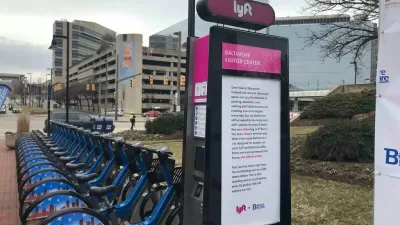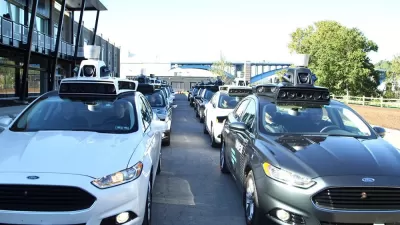A new study from KPMG predicts that the U.S. will go from a majority multi-car household to one where only 43% of households have more than one motor vehicle by 2040, and rideshare and car-share, along with demographic changes, will play key roles.

"As a growing number of consumers participate in car sharing [e.g., Zipcar], wait longer to buy their first vehicle and move to the suburbs, KPMG predicts that in about 25 years, fewer than half of U.S. households will own more than one vehicle," writes Phil LeBeau of CNBC.
According to the report, 57 percent of American households currently have two or more cars. Although that percentage has held relatively steady over the last couple of decades. Gary Silberg, (a partner at KPMG who conducted the study and heads KPMG's automotive practice) forecasts it will fall to 43 percent by 2040. That's thanks, in part, to the growing popularity of ride-share [e.g., Uber] companies.
The report is not centered on declining auto ownership, however. It is about the changing auto marketplace, and how auto manufacturers need to be innovative to survive. KPMG's press release states, "In its latest whitepaper, “Me, My Car, My Life [PDF],” KPMG’s automotive practice suggests that the era of ubiquitous connectivity - the moment when you, your car and your life are one - has arrived."
Greg Gardner of the Detroit Free Press adds to the dialogue on the future of car ownership by writing about a related, if conflicting talk given by Ford Motor Co. executive chairman Bill Ford in Dubai on Nov. 19.
Where the KPMG study and Ford diverged was on the role the traditional auto industry will play in solving the challenge of urban mobility.
Gardner indicates that whereas Ford sees the auto industry rising to the occasion to meet urban residents' mobility needs, Silberg foresees "displacement of the status quo." "We will see new players surge forth, some old players reinvent themselves and others totally left behind", said Silberg.
"What if autonomous driving could extend the driving life of the elderly?" Ford asked. "What if this technology could enable them to maintain the personal freedom that comes from mobility? Imagine how that could improve their quality of life, and reduce some of the dependency on caregivers."
"Silberg held firm to his projection that technology will deliver alternatives to individual vehicle ownership," writes Gardner.
"Owning a car is not the most rational economic decision," he said. "The average price of a car is around $31,000. The minute you drive it off the lot you lose 11% and, by the way, it sits idle 90% of the time."
FULL STORY: Wave goodbye to the two-car family

Maui's Vacation Rental Debate Turns Ugly
Verbal attacks, misinformation campaigns and fistfights plague a high-stakes debate to convert thousands of vacation rentals into long-term housing.

Planetizen Federal Action Tracker
A weekly monitor of how Trump’s orders and actions are impacting planners and planning in America.

Chicago’s Ghost Rails
Just beneath the surface of the modern city lie the remnants of its expansive early 20th-century streetcar system.

Bend, Oregon Zoning Reforms Prioritize Small-Scale Housing
The city altered its zoning code to allow multi-family housing and eliminated parking mandates citywide.

Amtrak Cutting Jobs, Funding to High-Speed Rail
The agency plans to cut 10 percent of its workforce and has confirmed it will not fund new high-speed rail projects.

LA Denies Basic Services to Unhoused Residents
The city has repeatedly failed to respond to requests for trash pickup at encampment sites, and eliminated a program that provided mobile showers and toilets.
Urban Design for Planners 1: Software Tools
This six-course series explores essential urban design concepts using open source software and equips planners with the tools they need to participate fully in the urban design process.
Planning for Universal Design
Learn the tools for implementing Universal Design in planning regulations.
planning NEXT
Appalachian Highlands Housing Partners
Mpact (founded as Rail~Volution)
City of Camden Redevelopment Agency
City of Astoria
City of Portland
City of Laramie





























